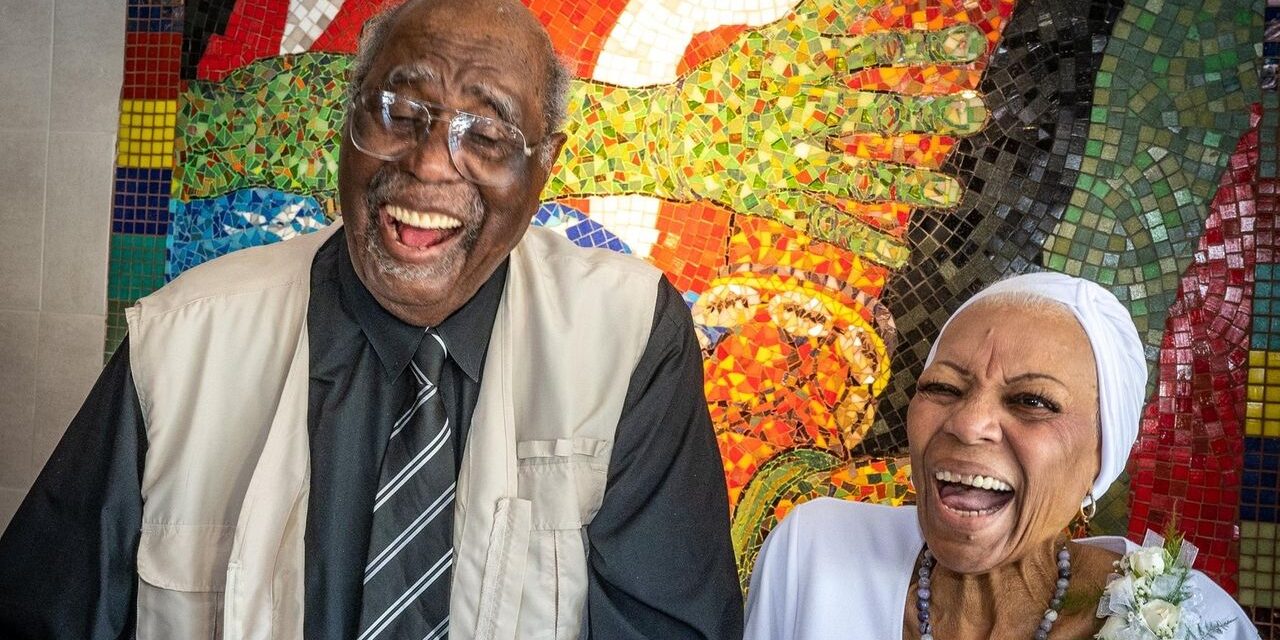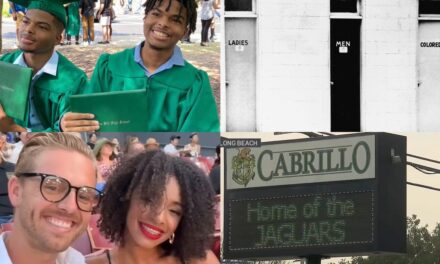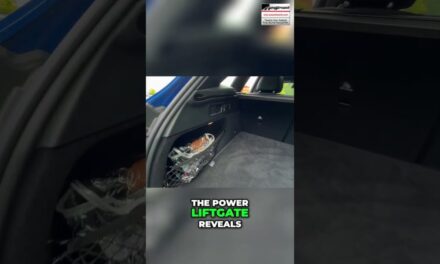Julius Pearse left his native North Carolina for Long Island in 1953, hoping for a better life — one far from the Jim Crow South.
Pearse, who had helped desegregate a local bus system in his home state, found that matters of race were not much better in New York, he told Newsday decades later. Taking a job in 1962 with the Freeport Police Department, where he was the village’s first Black police officer, he regularly heard racial slurs from his fellow cops, he said.
“They were trying to get me angry so I’d do something and get fired,” he told the paper in 2021. “But they saw that I wasn’t going anywhere.”
Pearse went on to serve 21 years in the department, retiring as a detective in 1983 — but that was only part of his story.
He and his late wife, Joysetta, became towering figures in Long Island’s Black community, helping families trace their genealogical lineages and preserving African American history at a Hempstead museum that now bears their names.
Julius Pearse, a self-taught historian and longtime Freeport resident, died Sunday from prostate cancer at Beach Terrace Care Center in Long Beach, said his son Gary Pearse of Hempstead. He was 91.
“This is a great loss for the entire community,” Hempstead NAACP president Barbara V. Powell said Tuesday, adding the Pearses were “trailblazers.”
“Mrs. Pearse was a walking encyclopedia herself regarding the museum and local Black history,” Powell said. “They were bigger than life itself. It’s not the same without them.”
The couple had the ability to describe life in segregated America from opposite perspectives.
She was born in Brooklyn to a multiracial family and raised in a largely desegregated neighborhood with white, Black and Jewish neighbors.
He grew up in the Jim Crow South, born on July 6, 1933, the son of a cook and a maid. The family lived on a farm, said Pearse’s sister, Jeanette Settles of Bear, Delaware.
“My brother was a good person,” Settles said. “If he could do things for you, he would. Being born in the South, it wasn’t easy. But we got along very well.
“My brother was an A student. … He had a mind of helping people.”
Hoping to become a lawyer, Pearse attended North Carolina Agricultural and Technical State University in Greensboro, majoring in chemistry and minoring in math.
“I was told I wouldn’t be successful with the Ku Klux Klan and segregation at their peak,” he told Newsday.
After moving to New York, where he initially lived with an aunt in Far Rockaway, Queens, Pearse worked a litany of jobs including cabdriver, factory worker, butler, chauffeur, bartender, bouncer, singer and bodyguard. He was drafted by the Army in 1956 and served for two years, his family said, adding he was the first Black singer in an Army Band.
Pearse married his first wife, the former Mabel Kerry, in 1953 in Far Rockaway, Gary Pearse said. She died in 1971.
Julius Pearse previously told Newsday he joined the Freeport police after friends told him the work was stable and the pay was good.
It was while on the job that he met Joysetta, recently widowed at age 40 when her first husband was killed during a robbery. Julius helped her fill out a crime victim form at the Freeport police station. They married in 1979.
Between them, the couple had four children from their previous marriages — two daughters from hers and two sons from his.
The Pearses founded the African Atlantic Genealogical Society in 1994, ran a private investigations agency and became involved with the Nassau County Black history museum in Hempstead four years later. Joysetta became its director in 2012. Julius worked there as a volunteer manager and researcher.
Three years ago, in May 2021, the museum was renamed the Joysetta & Julius Pearse African American Museum of Nassau County. Joysetta Pearse died one month later.
Tributes poured in this week as news circulated about Julius Pearse’s death.
County Executive Bruce Blakeman said Pearse and his late wife “made significant improvements to the education and historical record keeping of the African American community in Nassau County.”
County Legis. Debra Mulé (D-Freeport) said Pearse “enlightened and inspired generations of Nassau County residents through the exhibitions and events he curated and spearheaded.”
In addition to his sister and son Gary, Pearse is survived by another son, Dennis G. Pearse, of Rockingham, North Carolina, a brother, Eric Pearse of Inwood, and several grandchildren and great-grandchildren.
Funeral and burial information will be announced after the holiday season, said Anthony Richards, a family spokesman.
Julius Pearse left his native North Carolina for Long Island in 1953, hoping for a better life — one far from the Jim Crow South.
Pearse, who had helped desegregate a local bus system in his home state, found that matters of race were not much better in New York, he told Newsday decades later. Taking a job in 1962 with the Freeport Police Department, where he was the village’s first Black police officer, he regularly heard racial slurs from his fellow cops, he said.
“They were trying to get me angry so I’d do something and get fired,” he told the paper in 2021. “But they saw that I wasn’t going anywhere.”
Pearse went on to serve 21 years in the department, retiring as a detective in 1983 — but that was only part of his story.
Towering figures
He and his late wife, Joysetta, became towering figures in Long Island’s Black community, helping families trace their genealogical lineages and preserving African American history at a Hempstead museum that now bears their names.
Julius Pearse, a self-taught historian and longtime Freeport resident, died Sunday from prostate cancer at Beach Terrace Care Center in Long Beach, said his son Gary Pearse of Hempstead. He was 91.
“This is a great loss for the entire community,” Hempstead NAACP president Barbara V. Powell said Tuesday, adding the Pearses were “trailblazers.”
“Mrs. Pearse was a walking encyclopedia herself regarding the museum and local Black history,” Powell said. “They were bigger than life itself. It’s not the same without them.”
The couple had the ability to describe life in segregated America from opposite perspectives.
She was born in Brooklyn to a multiracial family and raised in a largely desegregated neighborhood with white, Black and Jewish neighbors.
He grew up in the Jim Crow South, born on July 6, 1933, the son of a cook and a maid. The family lived on a farm, said Pearse’s sister, Jeanette Settles of Bear, Delaware.
“My brother was a good person,” Settles said. “If he could do things for you, he would. Being born in the South, it wasn’t easy. But we got along very well.
“My brother was an A student. … He had a mind of helping people.”
Segregation barriers
Hoping to become a lawyer, Pearse attended North Carolina Agricultural and Technical State University in Greensboro, majoring in chemistry and minoring in math.
“I was told I wouldn’t be successful with the Ku Klux Klan and segregation at their peak,” he told Newsday.
After moving to New York, where he initially lived with an aunt in Far Rockaway, Queens, Pearse worked a litany of jobs including cabdriver, factory worker, butler, chauffeur, bartender, bouncer, singer and bodyguard. He was drafted by the Army in 1956 and served for two years, his family said, adding he was the first Black singer in an Army Band.
Pearse married his first wife, the former Mabel Kerry, in 1953 in Far Rockaway, Gary Pearse said. She died in 1971.
Julius Pearse previously told Newsday he joined the Freeport police after friends told him the work was stable and the pay was good.
It was while on the job that he met Joysetta, recently widowed at age 40 when her first husband was killed during a robbery. Julius helped her fill out a crime victim form at the Freeport police station. They married in 1979.
Between them, the couple had four children from their previous marriages — two daughters from hers and two sons from his.
History pursuits
The Pearses founded the African Atlantic Genealogical Society in 1994, ran a private investigations agency and became involved with the Nassau County Black history museum in Hempstead four years later. Joysetta became its director in 2012. Julius worked there as a volunteer manager and researcher.
Three years ago, in May 2021, the museum was renamed the Joysetta & Julius Pearse African American Museum of Nassau County. Joysetta Pearse died one month later.
Tributes poured in this week as news circulated about Julius Pearse’s death.
County Executive Bruce Blakeman said Pearse and his late wife “made significant improvements to the education and historical record keeping of the African American community in Nassau County.”
County Legis. Debra Mulé (D-Freeport) said Pearse “enlightened and inspired generations of Nassau County residents through the exhibitions and events he curated and spearheaded.”
In addition to his sister and son Gary, Pearse is survived by another son, Dennis G. Pearse, of Rockingham, North Carolina, a brother, Eric Pearse of Inwood, and several grandchildren and great-grandchildren.
Funeral and burial information will be announced after the holiday season, said Anthony Richards, a family spokesman.

Carl MacGowan is a Long Island native who covers Brookhaven Town after having previously covered Smithtown, Suffolk County courts and numerous spot news and feature stories over his 20-plus year career at Newsday.





